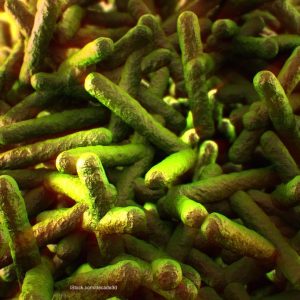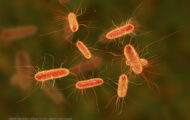The ongoing Listeria monocytogenes outbreak linked to commercially produced, prepackaged caramel apples has brought this bacteria into the spotlight. At least 32 people are sickened; 31 have been hospitalized, six people have died, and three children have Listeria meningitis. There are many things we don’t know about this pathogen, but we do know it’s a tricky little bug.
 Listeria is present in the environment and can live in the intestines of animals, birds, and people without causing illness. It can also have a long incubation period, up to 70 days, from the time of exposure to when symptoms first appear.
Listeria is present in the environment and can live in the intestines of animals, birds, and people without causing illness. It can also have a long incubation period, up to 70 days, from the time of exposure to when symptoms first appear.
But the trickiest thing about Listeria monocytogenes is that it can grow at refrigerator and freezer temperatures which are the traditional preservation methods used for preventing bacterial growth in food. Listeria bacteria can double their population within 1 day at 41°F.
If your freezer temperature is at 0°F or above, you could have a problem. And since refrigerators are set between 32°F and 40°F and are usually higher, the bacteria can have a field day in that appliance. That’s why the FDA has set a zero tolerance for Listeria monocytogenes bacteria in food sold in the U.S. Attorney Fred Pritzker, who represents clients sickened by this bacterium, said, “Because Listeria is so dangerous, every food processor should be aware of it and specifically implement policies and procedures to prevent contamination.”
Listeria is one of the few bacteria that doesn’t need a lot of water to grow, which makes it problematic for low water foods. It’s also salt-tolerant, unlike most bacteria.
Now that you know this, what can you do about this outbreak? First of all, throw away any commercially prepared, caramel apples you may have purchased this fall, even if they are stored in the freezer. Four brands (Happy Apple, Kroger, Karm’l Dapple, and Merb’s Candies) have been recalled, and two others (Carnival and Kitchen Cravings in Minnesota) are associated with the outbreak.
Then wash your hands with soap and warm water and clean the storage area, whether cupboard, pantry, refrigerator, or freezer, with a mild bleach solution to kill any bacteria. The recommended concentration for the cleaning solution is 1 tablespoon bleach for every gallon of hot water.
If you ate a commercially prepared prepackaged caramel apple in the last 70 days, monitor yourself for the symptoms of the illness. The long incubation time is one of the most problematic issues with this bacterial infection.
But now that you are informed, you can protect yourself. The symptoms of a Listeria infection can be gastrointestinal, with abdominal cramps, diarrhea, and nausea. They can also be flu-like, including headache, stiffness, fever, and confusion. Pregnant women are usually only mildly ill, but listeriosis can be devastating, causing miscarriage, stillbirth, and infection in the newborn baby. If you do get sick, see your doctor because treatment is available.




